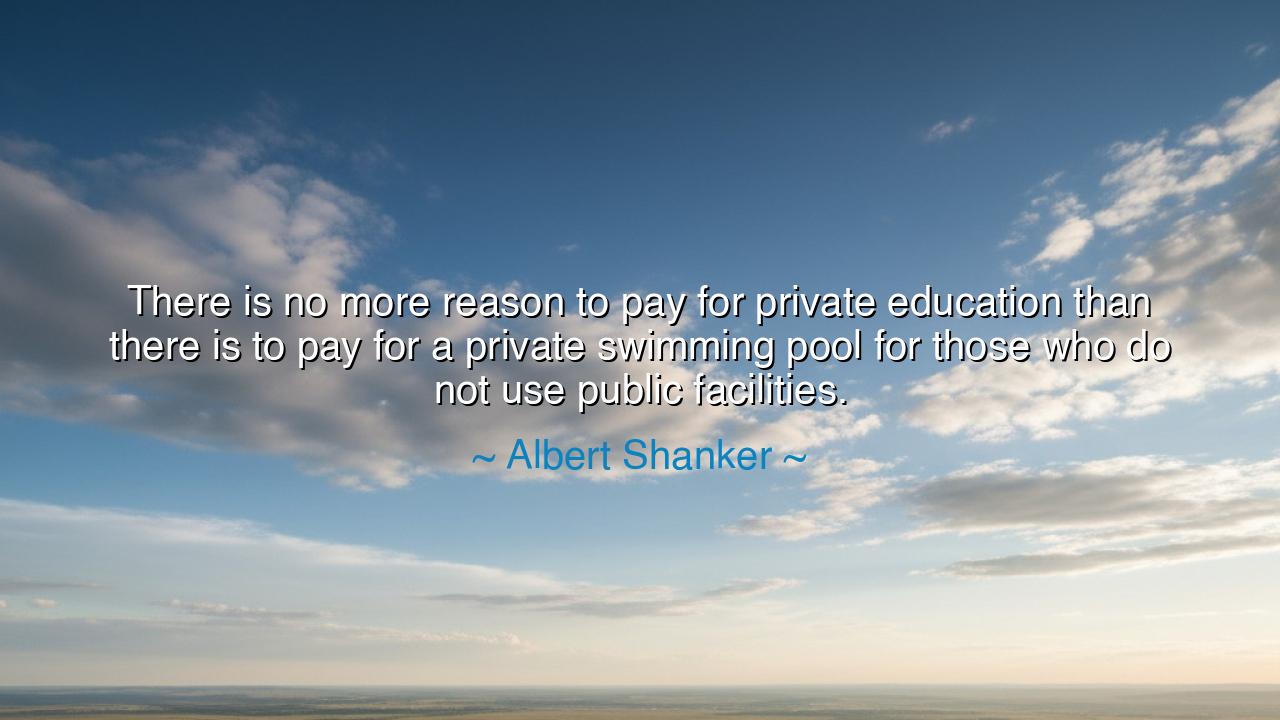
There is no more reason to pay for private education than there
There is no more reason to pay for private education than there is to pay for a private swimming pool for those who do not use public facilities.






Hear now the words of Albert Shanker, who declared: “There is no more reason to pay for private education than there is to pay for a private swimming pool for those who do not use public facilities.” At first glance, this saying seems practical, even simple. Yet within it lies a teaching as profound as any carved into the stone of old temples: that the strength of a people is measured not by the riches of the few, but by the common good shared by all. For when education, like water, is confined to the wealthy alone, society withers. But when it flows freely to every child, it nourishes an entire nation.
The image of the private swimming pool is not chosen lightly. It glistens in luxury, but it serves only a chosen few. Meanwhile, the public pool, like the public school, is built for the whole of the community—rich and poor, strong and weak, all together under the same sun. Shanker’s wisdom reminds us that education is not a private indulgence but a collective responsibility. To withhold it, or to demand that each family purchase their own, is to weaken the very foundation of democracy.
Consider history, and the struggle of the United States in the nineteenth and twentieth centuries. There was a time when children of poor immigrants crowded into underfunded schools, while the wealthy fled to private academies. Yet reformers fought to strengthen public education, declaring that the Republic itself depended upon the enlightenment of its people. Horace Mann, known as the father of American public schools, proclaimed that education must be the “great equalizer.” Like Shanker, he understood that only when all children drink from the same well of knowledge can society thrive in justice and opportunity.
Reflect also on the story of Finland in modern times. Once struggling with inequality in its schools, it chose a bold path: to abolish most private education and devote resources to strong public schools accessible to all. The result was astonishing. Within a generation, Finnish students rose to the top of international rankings, not because a few were privileged, but because all were uplifted together. This is the living proof of Shanker’s vision—that the greatness of a nation’s youth lies not in dividing resources, but in uniting them.
And yet, even today, many turn their eyes only to their own households, thinking, “I shall secure for my child alone, and let others fend as they may.” But such thinking is folly. For the child of one family grows to be the neighbor, the co-worker, the leader of another. If he or she is left in ignorance, it is not only their loss but the loss of the entire community. To weaken the public school is to weaken the very society that sustains us all.
Therefore, the lesson stands clear as a mountain in the dawn: we must cherish and defend public education. It is the hearth where the future is kindled, the shield against ignorance, the forge of equality. Let no one scorn it, nor abandon it for the sake of private luxury, for its strength is the strength of the people themselves.
What then should you do? Support the schools in your community. Raise your voice for fair funding, for well-trained teachers, for equal opportunity. Honor the common bond that joins all children in their right to learn. If you have means, do not withdraw them into isolation, but invest them back into the public good, where they shall multiply a hundredfold in the lives of generations.
So remember Shanker’s words: education, like water, like light, like air, must be for all, not for the chosen few. To build pools only for the privileged is to divide a people. To build schools for all is to unite them. Pass down this wisdom, that the children of tomorrow may swim not in isolation, but together in the vast ocean of shared knowledge, strengthened by the unity of the public good.






AAdministratorAdministrator
Welcome, honored guests. Please leave a comment, we will respond soon